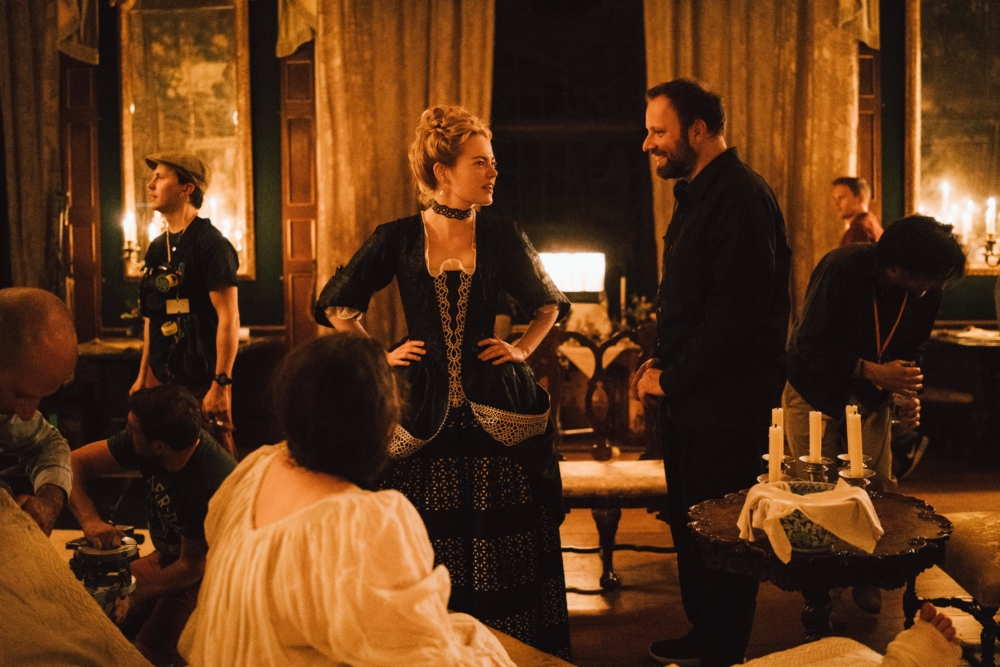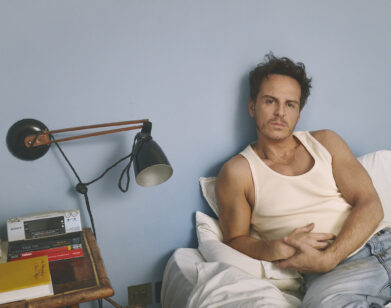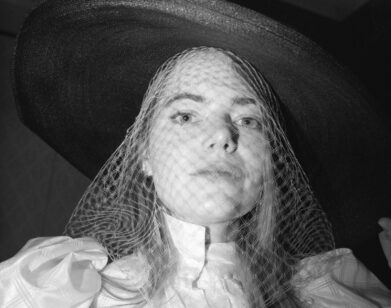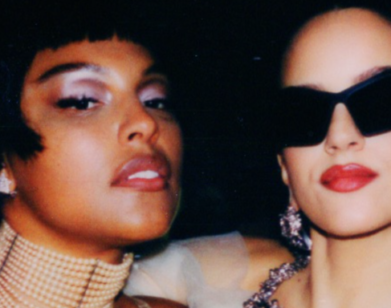Fifteen awkward minutes with Yorgos Lanthimos

Emma Stone and the director Yorgos Lanthimos on the set of The Favourite. Photo by Atsushi Nishijima. © 2018 Twentieth Century Fox Film Corporation All Rights Reserved
Be thankful you don’t live in a Yorgos Lanthimos movie, where the routine indignities of life tend to be trivial hiccups taking place in the shadows of something larger. To be, I imagine, any of the characters in Dogtooth (2010), The Lobster (2015), or his latest feature, The Favourite, would mean navigating a world where debasement and primal logic are the full range of human emotions. It would be, to be precise, fucking exhausting.
There’s something rejuvenating about watching The Favourite’s Emma Stone, Rachel Weisz, and Olivia Colman make a monomaniacal weave out of the infinite shades of humiliation. While watching the Greek director’s period drama, set in the early 18th century and following the deranged court of Queen Anne, it’s best to remind oneself that these are not your humiliations to bear. It’s the great skill of Lanthimos that, despite the sculptural hair and corsets—the very distance of a story set some two hundred years in the past—the poisoned humanity of his cast is as pungent as anything set in the present. Prior to the film’s premiere, I spoke with Lanthimos about his artful awkwardness, uncomfortable sex, and the beauty in things not working.
———
Considering how deadpan your work is perceived to be, I always imagine, for better or worse, that you’re simply fucking with the viewer, but why?
I either enjoy things or not. And things either make me think, or they don’t. Or they mess with me, and I feel awkward. So, yes, you’re right. Whatever you mean by fucking with you, I do enjoy awkwardness. I think it’s an important feeling for people that maybe generates some kind of thirst to wonder about things. As an audience member myself, I love to be in a position where I’m trying to figure out what I am supposed to feel, or if what I’m feeling is appropriate or not.
Would you say you’re a student of awkwardness in your daily life?
I wouldn’t say that. It’s just an accumulative process of going through life and being sensitive to what’s happening around you.
Sex through all of your films is very jarring, or unsettled. In this film, sex is strictly about power—obtaining it, doling it out, clarifying who possesses it at a given moment. Why this particular focus?
I’m interested in sharing that part of [sex]. It sheds a light on things that interest me more than something that works perfectly. And not just with sex, but in any kind of activity. I wouldn’t know what to say about something that worked in a perfect way, so I guess in everything I try to find what doesn’t work, and expose it, and then see how it relates to people and their stories and their character. Sex is no different.
Emma Stone said something recently about having to finger a sponge at one point during her sex scenes, which does sound awkward.
It was practical and technical. When you design something like a sex scene, you’re just trying to achieve it. There’s cameras. There’s positions. There’s this, that. There’s things that don’t make sense. A hand has to be how many inches to the left or to the right in order for it to appear to be in a certain place. It’s all about logistics.
Do you consider yourself to be an awkward person, uncomfortable in general? From what’s said about you on set, you’re viewed as a very calm and collected director.
It’s probably very untrue how you see yourself. I am calm but on the outside, mostly. When I’m on a film set, the stress is so humongous that I’m dying inside—I’m extremely stressed, but I do try and… well, I don’t try. I think it’s my natural reaction to not externalize things.
For a period piece, this film carries itself with what I guess you could say is a verbal nonchalance, as if you didn’t want to sweat the small stuff. I read that language was the last thing you felt like you needed to research.
This film was never going to be a history lesson. I wanted to make something that felt relevant and modern, so that kind of went and informed every element with which we constructed the film. Language, obviously, was the first thing that we had to deal with, and there wasn’t even a discussion whether we would imitate how we think people spoke at the time.
It’s been said that the word “cunt” is used “explosively” in the film.
I think the presentation of those times is too civilized and too sterilized. When people recreate a period, for some reason they just stick to the more formal stuff. We wanted to get away from the notion that these characters would be basically standing like they stand in paintings. This probably wasn’t true of how people acted at all! Foul language is something that they probably used a lot. And besides, I found it funny.






